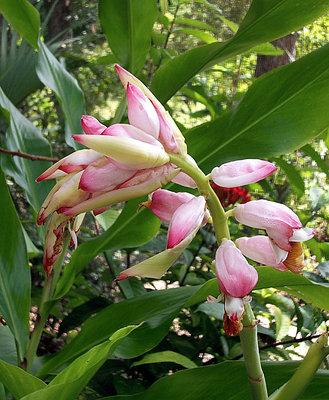Many many thanks to a blog reader who sent me an absolutely fascinating link this morning: http://goo.gl/5rcGR How in the world did I miss this? Hmmm. Well, I did… Luckily, I have some very dedicated blog readers who send me all sorts of interesting things (including some hilarious stuff…) to keep me on my toes! 🙂
 Anyway, the link will take you to a paper that was presented at the December 2010 ASH conference. Cardamonin is extracted from a lovely plant called Alpinia katsumadai (see photo), which belongs to the ginger family (hmmm, quelle surprise…NOT!) and is widely used in traditional Chinese medicine.
Anyway, the link will take you to a paper that was presented at the December 2010 ASH conference. Cardamonin is extracted from a lovely plant called Alpinia katsumadai (see photo), which belongs to the ginger family (hmmm, quelle surprise…NOT!) and is widely used in traditional Chinese medicine.
Cardamonin affects both the STAT3 and NF-kappaB pathways, which, as we know, are crucial for myeloma cell survival and proliferation. It also enhances the anti-MM activity of some conventional drugs used in the treatment of multiple myeloma: vincristine, doxorubicin, dexamethasone, bortezomib and thalidomide. Well, well…
But it also strongly induced cell apoptosis…That means that it killed myeloma cells…all by itself…Yaaaaaay!
Right before the “Conclusions,” you can read about all the things that cardamonin inhibits in myeloma cells. In addition to the two above-mentioned pathways, it also has a strong effect against COX2, Bcl-2, Bcl-xL, survivin, VEGF (angiogenesis) etc. etc. etc. etc. etc. Wow. It’s like reading about the effect of curcumin on myeloma cells…amazing…
Oh, I just read in PubMed that cardamonin also has antiviral activity. In fact, it STRONGLY inhibits the H1N1 virus, see: http://goo.gl/Bxpvp Well, I definitely need to do more research on this compound…when I have a bit more time…Still, from the little I have read this morning, it all sounds very promising, so much so that I hope this new substance receives a lot of attention! Hmmm, I wonder if it is commercially available? I mean, if it is used in traditional Chinese medicine, it must be…okay, need to check that, too.
But now I have to rush off. Take care, everyone…especially you, Paula!
Margaret,
Good news! Maybe this is interesting (link to a PDF report: Anti-inflammatory Activity of B Flavokawain from Alpinia pricei Hayata):
http://www.google.nl/url?sa=t&source=web&cd=2&ved=0CCMQFjAB&url=http%3A%2F%2F140.120.93.1%2Fup_book%2F%25E6%259B%25BE%25E5%25BD%25A5%25E5%25AD%25B8_2009630015636jf900517d.pdf&rct=j&q=cardamonin%20low%20price&ei=YUBdTYz4AoGaOtzYrYkL&usg=AFQjCNFyG_Qt3u7jg6ZhDAuZFz85oq0IXQ&cad=rja
I saw the price of cardamonin very very high, unfortunately 🙁 Maybe there is an alternative
Hans
Alpinia katsumadai seeds, which contain 0.5-1% cardamonin, are available from oriental herb suppliers. It is used in chinese folk medicine. The cost is about $18/500 grams.
According to http://www.healthline.com/natstandardcontent/alpinia/3?brand=, the usual dose is 0.5-1 gram steeped in 150 ml hot water.
The article you reference tested levels from 0-100 micromolar, which is 0-27 mg per liter (MW=270).
At 1%, a gram of seeds will contain 10 mg of cardamonin, or about 37 micromoles.
So, if cardamonin is 100% absorbed, it probably can achieve physiologically significant concentrations at the suggested dose level. Other references indicate it is “well tolerated.” I couldn’t find any in vivo studies, so it looks very experimental at this point.
An oriental herbalist could probably provide additional guidance.
FrankH
Hi Margeret, hi Frank, do you know a shop, where capsules of this stuff are supplied in europe? Or any shops. Thank you, Peter
Thanks, Frank, for for your calculation (i was looking at the price of pure cardamonin (85 euro/5 mg), but the Alpinia katsumadai seeds are not expensive.
Off topic: also interesting to investigate how to improve solubility (bioavailability) of turmeric:
– Nano-sized curcumin capsules may boost the body’s uptake of the ingredient, and enhance its potential to prevent colon cancer and Alzheimer’s disease, suggests a new study from Japan.
– Bioavailability enhancement of curcumin by complexation with phosphatidyl choline (www.ncbi.nlm.nih.gov/pubmed/21108415).
– Evaluation of curcumin acetates and amino acid conjugates as proteasome inhibitors (www.ncbi.nlm.nih.gov/pubmed/20818481).
– Curcumin Nanoparticles: Preparation, Characterization, and Antimicrobial Study (www.ncbi.nlm.nih.gov/pubmed/21322563)
– The curcumin analog GO-Y030 is a novel inhibitor of IKK? that suppresses NF-?B signaling and induces apoptosis (www.ncbi.nlm.nih.gov/pubmed/21272158)